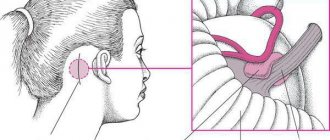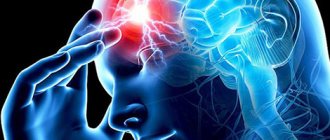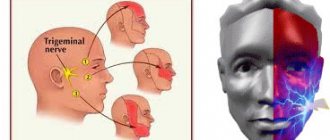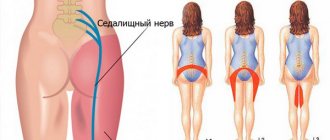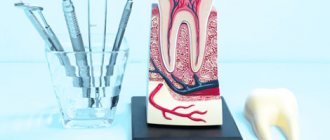What is the trigeminal nerve
The human face has many muscles and nerve endings. Not only the mucous membranes of the nose, pharynx, and conjunctiva, but also the nerve endings can become inflamed. This is most often associated with neurological disorders that change the sensitivity of the fibers that conduct impulses.
With neuropathy of the facial area, acute shooting pain occurs on the right or left. Mirror inflammation of the trigeminal nerve is extremely rare. It is located in the temporal region, near the base of the auricle. And from it there are branches along the entire half of the face:
- jaw nerve (upper and lower);
- optic nerve;
- infraorbital nerve.
The trigeminal nerve passes through the bone tissue in several places, which plays an important role in the occurrence of inflammation associated with pinching. Thus, inflammation of the trigeminal nerve can result in acute pain both in the upper and lower jaw, and in the forehead area, covering the eye sockets.
Symptoms of facial nerve disease
If a person has a cold on the facial nerve, symptoms of the lesion appear in the form of unilateral or bilateral lesions. Often the affected part of the face (cheek, ear, chin) may become painful or numb. In 90 percent of cases, paresis is unilateral. The reason for this is that the temporal portion of the facial nerve is the most vulnerable.
Paresis (prosoparesis) is a decrease in voluntary movements of facial muscles. It has significant differences from paralysis. Paresis involves only partial impairment of muscle function.
The problem in diagnosing the disease is that paresis is not easy to notice (especially in mild forms of the disease). It only appears when a person speaks.
Paresis is divided into mild and severe. The mild form is characterized by minor changes in facial expressions in conversation. Severe paresis is a very indicative symptom of the disease. Such a defeat is expressed in the fact that the face turns into a mask. It is difficult for the victim to puff out his cheeks and close his eyes. Also, these movements are accompanied by pain.
Pathological synkinesis is divided into eyelid-labial and eyelid-frontal. In the first case, when the eyelid lowers, the corner of the mouth rises. In the second, when the eyelid droops, the forehead wrinkles.
The causes of paresis are:
- Fiber compression.
- Nerve damage.
The first reaction of neuritis is usually drooping of half the face and lacrimation.
Paralysis is also observed in the following:
- it is difficult for a person to speak;
- the victim has difficulty swallowing;
- the patient experiences lacrimation and salivation;
- there is a lack of sensation of taste of food;
- there are painful sensations in the face that are shooting in nature;
- the corners of the mouth and eyebrows (on the right or left side of the face) are lowered;
- difficulty closing your eyes;
- the victim feels pain in the ear, jaw;
- asymmetry of the facial muscles occurs;
- it is difficult for a person to whistle and puff out his cheeks;
- Sometimes the patient experiences eye twitching.
Thus, the main symptoms are expressed in high or reduced skin sensitivity; facial pain; malfunction of the salivary and lacrimal glands; numbness; pain inside the face (usually aching or dull); problems with facial expressions (reflected on the part that is cold).
Signs of the disease also differ depending on the phase. In the acute course of the disease, the lesion can be very visible, in this case the degree of facial distortion is very large.
Causes of inflammation of the trigeminal nerve
There are several reasons leading to inflammation of the nerve ducts:
- Poor blood supply associated with physical compression of the nerve. First of all, this is swelling caused by diseases of the ENT organs. The resulting tumor can also pinch the nerves.
- Inflammation associated with dentistry. This includes gingivitis, periodontitis, caries, pulpitis, and eruption of wisdom teeth. Each of these diseases can lead to suppuration, abscesses, swelling and bacterial infections of tissues.
- Medical error by an anesthesiologist - if the injection was given unsuccessfully and the needle got into a nerve, pain cannot be avoided.
- Hypothermia causes muscles to lose their elasticity, which leads to pinching of the nerves passing between the fibers.
- Bacterial infections, in particular tetanus and polio.
- The cause of inflammation of the trigeminal nerve, which is difficult to diagnose, is the psychological state of a person - frequent experiences, stress, and nervous disorders.
To determine the cause of inflammation, you need to consult a specialist.
Prevention
Of course, such unpleasant conditions can be avoided using fairly simple prevention methods. “You should not go outside without hats, especially in winter and in windy weather. It is also necessary to use scarves to avoid blowing through the neck and back of the head. You should also avoid hypothermia of various kinds by dressing appropriately for the weather. In addition, special attention should be paid to supporting the immune system - there are a lot of ways, and quite diverse. You can also use vitamin therapy to strengthen the body’s defenses, but it must first be agreed upon with your doctor in order to take exactly those microelements and nutrients that you need during this period of time,” notes the immunologist.
You shouldn’t let the disease take its course, and you shouldn’t count on the fact that your immune system is strong, so running down the street without a hat is no big deal. There are always risks. And it’s better to take care of your health in advance.
Break up with ARVI. How to properly recover from a cold? More details
There are contraindications, you should consult your doctor
Treatment methods
Depending on what caused the inflammation, a course of treatment is prescribed. For bacterial lesions, the emphasis is on antibacterial therapy through systemic administration of drugs.
However, regardless of the reasons, the doctor prescribes painkillers to relieve pain and reduce inflammation. It could be:
- ibuprofen;
- paracetamol;
- analgin;
- ketorol;
- diclofenac.
All of the listed drugs can be prescribed either in the form of tablets for oral administration, or prescribed in the form of solutions for intramuscular administration.
When conservative methods are not possible, the help of a surgeon may be needed. This primarily concerns abscesses due to the eruption of wisdom teeth, pulpitis or other dental diseases. In this case, the abscess will be opened, pus will be removed, the wound will be treated with antiseptic, and the tooth will be removed, if necessary. If a pinched nerve occurs as a result of pathologies in the structure of the skull, the surgeon will perform an operation to correct the situation and free the nerve bundles.
As a complex therapy, massage, heating or exposure to a magnetic field and electric current can be prescribed. You cannot massage or warm the inflamed area yourself, because this can lead to complications associated with rupture of the purulent capsule, blood poisoning and paralysis of the facial nerve.
Separately, you may need to consult a neurologist who will determine the cause of the inflammation if other specialists have not found obvious foci of infection and abscesses.
Traditional methods of treatment are permissible only as an addition to the main therapy. For example, rinsing with chamomile decoction will relieve inflammation and reduce swelling. But you can resort to such procedures only with the permission of the attending physician.
What diseases does it occur in?
First, you need to look for inflammation near the affected lymph node. Usually bacteria or viruses enter it from a nearby organ.
Diseases in which the cervical lymph node becomes inflamed:
- acute respiratory infections and acute respiratory viral infections;
- tonsillitis (acute or chronic);
- dental diseases (focus of infection in the mouth).
Enlarged inguinal lymph nodes are often associated with sexually transmitted diseases, including herpes infection. Axillary units are inflamed with hidradenitis - a pathology of the sweat glands.
Sometimes inflammation of the lymph node occurs against the background of a general weakened state of the body. This is observed in malignant neoplasms, blood pathologies, HIV infection and viral hepatitis B.
In a chronic specific inflammatory disease, an enlarged lymph node is a normal variant. This is a reaction to the underlying pathological process and does not require treatment.
Enlargement of more than one lymph node often indicates infection. This is how tuberculosis, syphilis, and tularemia manifest themselves. Inflammation of a large number of lymph nodes indicates a serious infectious process - HIV, toxoplasmosis, brucellosis, CMV, mononucleosis and others. This requires urgent consultation with an infectious disease specialist.
Possible complications
Doctors call facial paralysis the first complication that appears in the absence of adequate treatment. This means that a person who does not receive medical care in a timely manner is deprived of the opportunity to express his emotions through facial expressions on one side of his face. This condition can no longer be corrected, which will certainly affect the quality of life. Distortion of facial expressions will lead to the development of depression and constant dissatisfaction with one’s appearance. Not every patient can come to terms with irreversible changes in their appearance without deep distress.
One of the most unpleasant manifestations of paralysis is the inability to close the eyelids on the injured side of the face. In this case, the eye will have to be regularly instilled with artificial tears to prevent the cornea from drying out, since natural hydration through blinking becomes unavailable for this eye.
Reasons for development
Facial nerve neuropathy can develop for the following reasons:
- progression of herpes, polio, mumps, enterovirus;
- hormonal imbalances (the disease appears especially often in the first half of pregnancy);
- tooth infections;
- sudden and severe hypothermia;
- injuries of the skull and jaws;
- sinusitis, otitis;
- diabetes;
- poor circulation in the blood vessels of the face;
- multiple sclerosis.
Most often, the disease in question develops when the facial nerve is cold - a short stay in a draft is enough for the inflammatory process to begin its progression.
Prevention of inflammation
To prevent the risk of developing inflammation of the trigeminal nerve, it is recommended to follow a number of measures:
- monitor oral hygiene and consult a dentist in a timely manner;
- do not stay in the cold for a long time or protect your face from freezing with a scarf;
- do not self-medicate otitis media.
At the first manifestations of pain on the face, you should immediately consult a doctor. This will stop the development of inflammation. In addition, early diagnosis allows for conservative treatment methods.
Diagnostics
The first thing to do if a lymph node is inflamed is to visit a doctor. He will inspect not only the disturbing group, but also the neighboring ones. It’s easy to miss this on your own, but detecting such changes will help make a diagnosis. If several lymph nodes are affected, the mucous membranes and skin are also examined for rashes.
The phased examination includes:
- General and biochemical blood test, general urine test.
- Testing for hepatitis B and C, HIV, syphilis.
- Fluorography, if necessary, an x-ray of the lungs.
- Ultrasound of the abdominal organs.
- Ultrasound of lymph nodes.
- Biopsy of lymph node tissue.
Based on the research results, a diagnosis is made and treatment tactics are formulated.
Why us
Advantages of visiting our medical center:
- Doctors. We welcome specialists of the highest qualification category, holders of academic degrees, with extensive experience in leading Russian clinics.
- Individual approach. The doctor will develop an individual treatment plan for each patient in accordance with the cause of development and clinical picture of the disease.
- Complexity. Effective treatment of edema and the diseases that cause them is possible thanks to the close cooperation of our clinic’s specialists - therapist, cardiologist, allergist, endocrinologist, urologist, etc.
- Expert equipment. All studies are carried out using modern equipment and are highly accurate.
- Comfort. All consultations, studies and treatment are carried out within our hospital, which allows our patients to save money.
You can see prices for services

